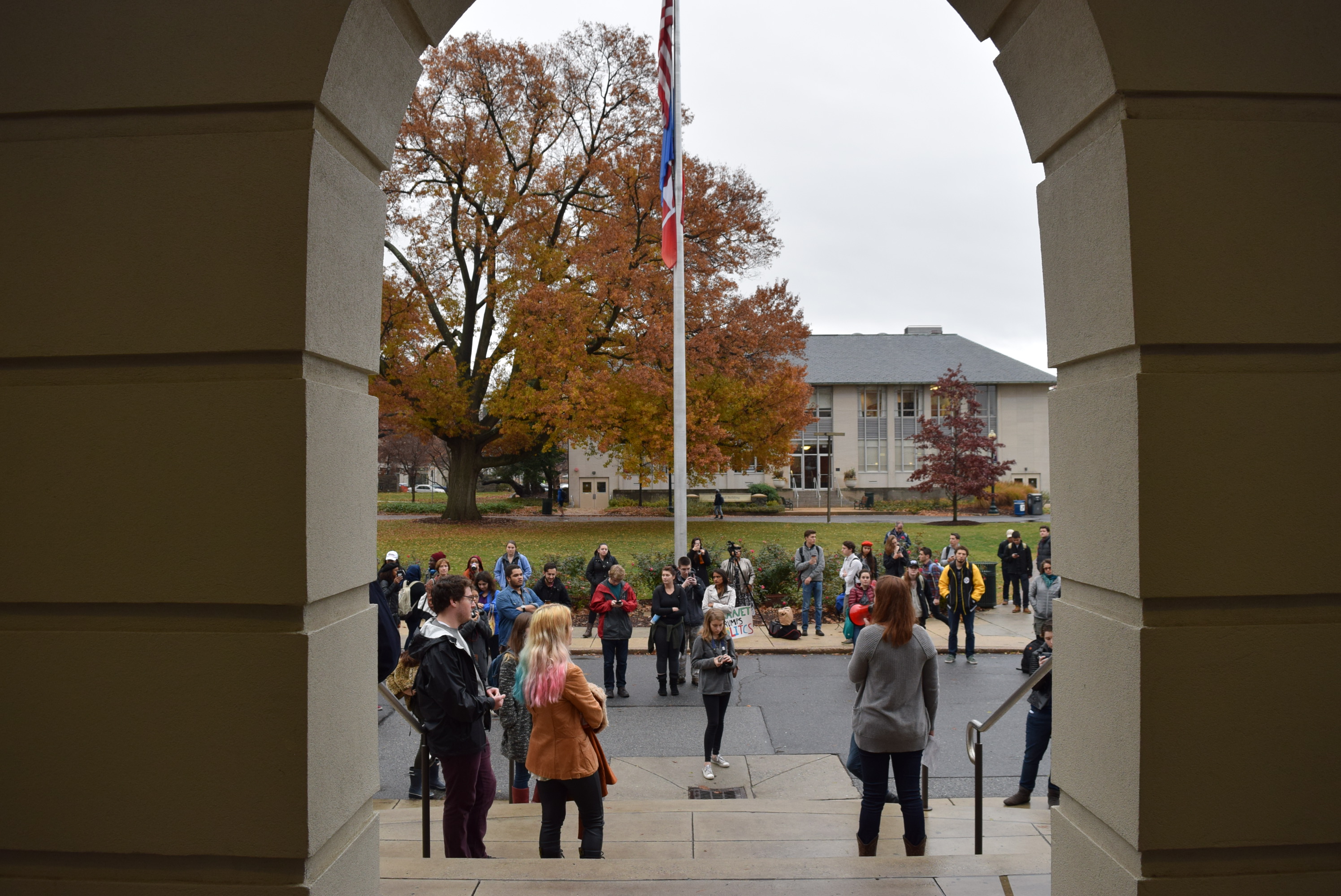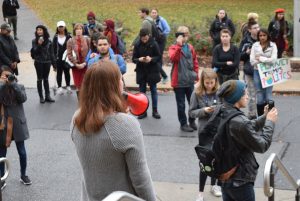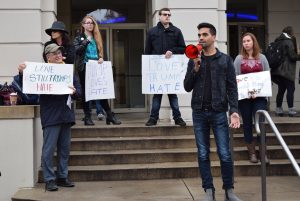
… we have to work hard to be heard!
An op-ed about the protests after the election of Donald Trump, written for my writing class at American University. Although it is now over a month old, my point sill stands, even and especially after the Women’s March.
Exactly three weeks after the presidential election, students from American University protested on the campus against the President-elect Donald Trump. The sky was grey and drizzel slowly but steadily came down on the fourty students that had gathered. Several students spoke out against Donald Trump, hate crimes and the injustices of the whole system. There was some clapping, agreeing nods and after 30 minutes, the „walk-out“ was over and everybody walked away.
According to Lauren Kosakowski, one of the organizers of the protest, this was part of a bigger movement.
“We’re the generation that is bringing back the 1960s protest culture,“ the student of Psychology and Creative Writing told me after the protest. „With social media we have so many more outlets to say our mind, to pass along newspaper articles, facts, stories, narratives and that’s creating a global movement that – I think – spreads.“
I disagree.
Sure, in the days after the election of Donald Trump, there were several and large protests in cities all around the country. I’m also aware that a lot of electors in the electoral college were overwhelmed by phone calls in the week after the election by people urging them to vote against Trump. 
But I don’t see continuing mass protest on the streets. I don’t see activities on Facebook or other social media that come close to conservative activsm. And I don’t see how the protests have had any impact on what Donald Trump has done during the transition period.
I feel that the wave of outrage amongst millennials against Donald Trump has become a trickle. I’m not the only one with this impression.
„Not based in reality“
“To compare [the current protests] to the sixtees means they have no idea of what happened in the sixtees,” said Cathy Schneider to me. She’s a professor at American University, teaching about social movements. “I consider that to have no base in reality or in fact.”
Strong words, but I fear, they are true. And it’s not a big surprise that the protests only lasted for some days. Massive youth movements don’t just appear out of nowhere.
“If you look at the civil rights movement, that was a movement that had been organizing strategically for decades,” Prof. Schneider told me. “They build a network of organizations across the South, in black colleges, in black churches. They developed movement centers that coordinated that and centers that connected different cities. That was years in the making, that’s what we have to be doing. We have to be developing these kinds of organizations, we have none of that right now.”
Let’s talk about politics!
We don’t even have enough political interest. According to a study of the Pew Research Center, just above one quarter of millennials say “politics & government” were in their top three of interests. Before we think about creating a global movement, maybe we should first know what’s happening in the world.
After that, we should start talking about politics. 35% of Millennials did that in 2014 (according to the study of the Pew Research Center) at least a few times a week, trailing all the other generations. But how are we going to convince someone of our political believe, if we don’t shape our arguments in every day conversations (and might realize that some of them are not as good as me might think)?
Change will not happen on social media
If you want to, you can do both of these things with the help of social media (but watch out for fake news!). But change will not come from a comment section on Facebook.
If we want change, it is not enough to tweet #notmypresident or to go to protest if it happens to be on your way to class. We have to engage in politics and create politics on our own. But this won’t happen on social media. This can only happen outside of our dormrooms, in our local communities, student organizations and – as cracy as it sounds – in political parties.
We are not the sun!
Because if you like it or not – these parties are still the most important organizations when it comes to politics. And they are run by old people. Which is not a surprise, because it is easier to engage in party work if you have a steady income and don’t move every two years. But how do we want to achieve, that topics like student debt are top priorities, when the people who eventually decide what’s important can’t relate to the feeling of having thousands of dollars of loans to pay off?
It is part of being young to think that we are the center of the universe. But we have to face the fact that for politicians, we’re not the sun. We’re just some random planet with little gravitas.
Want to change something? Start with voting!
That’s our own fault. There is a very simple way to make us more important, and I’m not talking about protesting or engaging in a political party. It’s voting.
Since the ages of Nixon, less than a half of people under 24 went to elect their next president. So this is not a problem only millennials face – for some degree, it has existed forever. But politicians want to be elected. And if we don’t show up at the polls, than there is little incentive for politicians to spend time developing policies that help us.
At least that was the conclusion of scientists from the Portland State University, when they found out, that it was close to 20 times more probable that a person above 65-years of age would vote than 18- to 34-year-olds.
 “The implicit lessons here for calculating mayoral candidates?”, the scientists asked, just to give an answer. “Certain parts of the city just aren’t worth their time – and it’s better electoral politics to pay more attention to two elderly voters on the street than a dozen or even two dozen young citizens at a neighborhood event.”
“The implicit lessons here for calculating mayoral candidates?”, the scientists asked, just to give an answer. “Certain parts of the city just aren’t worth their time – and it’s better electoral politics to pay more attention to two elderly voters on the street than a dozen or even two dozen young citizens at a neighborhood event.”
As a politician, betting on youth turnout can doom your campaign
I have to admit – I would understand politicians who don’t bother to win over a lot of young voters. Currently, they have a lot more incentives to create policies in favor of the elderly and not the young. That might not be the best for society, but it’s definitely better for their election chances. Just ask Hillary Clinton. Betting on the turnout of young people can doom your campaign.
You see, there are so many thing we could and should do, before we’re even thinking about a global movement and if we would take some of these steps, we probably wouldn’t need one after all. But I know that we’re often times taught to put us in the first place, and with social and monetary obligations, it might be tempting to continue to keep our heads down and concentrate on our lives.
The best news: Engament for society is a selffish act!
But you can keep your head as far down if you want to, you won’t change the fact that politics and society have an influence on your life. So closing the eyes is just at the first glance a selfish act.
But if you do something for your society, you’re actually doing something for yourself. And by that I don’t mean enhancing your resume and your personal abilities (although that is a nice side note). Your life will be more enjoyable if you live in a society that you find more enjoyable. But an enjoyable society is not Netflix – it won’t come to you while you’re chilling on your couch.